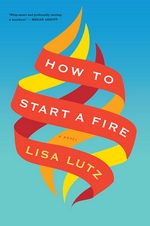 |
The Swallowsby Lisa Lutz Hardcover, 399 pg. Read: August 21 – 22, 2019 |

As I gazed at my students, I had the same thought I always had on the first day. They looked so young and innocent. Then I found a dead rat in the bottom of my desk drawer and remembered the tenet I had learned over the last eight years. The young may have a better excuse for cruelty, but they are no less capable of it.
For someone looking for omens, it’s odd how many exit signs I chose to ignore.
If a century of tradition were the only thing my time at Stonebridge brought to an end, I’d be okay with that. It’s the two deaths that keep me up at night.
How can I talk about The Swallows without ruining the experience? Not easily, and verbosely. Let’s see if I can manage it.
Structurally, it’s a boarding school book—a bunch of well-off (and/or scholarship) kids livingly largely without parental supervision and guidance, getting away with all sorts of things while the adults responsible for the supervision turn a blind eye, are honestly oblivious, or are complicit in the goings-on. At the end of the day, the real power is wielded by the students—a small sub-set of them, anyway—and there’s a split between those wanting to exercise their power for their own pleasure and benefit (largely male at the expense of female empowerment, self-respect, self-esteem, and dignity) and those, well not wanting that.
Largely the book focuses on a small group of female students sick and tired with the status quo (offended and angry, actually) who set out to expose the cabal and the horrible games they play with people in a way to salt the earth so it can’t be repeated. This seems like a tall order, but what choice do they have? They also have male students sympathetic to their cause and are willing to help out.
But also, there’s a teacher (or more) not willing to go along with this, and who knows something’s going on, so she does what she can to track it down to find ways to stop it (either herself or via student/faculty proxies). Her name is Alex Witt and she’s just arrived at Stonebridge Academy following an ignominious departure from Warren Prep. It takes her very little time to determine that something is rotten at Stonebridge and that a couple of her students are trying to do something about it. Instinctively in agreement with them, Alex does what she can to encourage the individuals to find one another and use the strength their numbers and collaboration can bring. One student described her as:
…my friend, my ally, my confidante. She charmed, teased, amused, incited, and befriended us.
Alexandra Witt was the pied piper of Stonebridge Academy.
Chapters are told from the perspective of Alex or some of the other faculty or various students—primarily from the perspective of Gemma Russo (the student quoted above). Gemma was well on her way to a time as a firebrand, but with nudges and aid from Alex, her crusade picks up momentum until upheaval comes to the existing conditions and then all bets are off (see that last line of the opening quotation). Essentially, Alex is John Keating without the stand-up or poetry, making Gemma Neil Perry, I guess.
The book starts off as offbeat, with Gemma as this strange instructor in an alien environment, trying to escape her legacy and to maybe find a little peace while the students are running around pretending to be revolutionaries. But it shifts at a certain point, and while still occasionally comic and never anything but fun to read, it sheds the comedy in favor of earnest emotions and motives and dangerous situations. You don’t notice it happening, but after a certain point, you’ll notice the ground has shifted. Lutz pulls that off really well.
There’s a lot of subtle work to the plot and the prose, and some that’s pretty obvious. But even the obvious is done well. There’s a reveal toward the end of the book that caught me so off-guard, but was so perfect I think I laughed out loud. I think this is technically streets ahead of Lutz’ previous work.
It’s a very different kind of humor than we got in The Spellman Files, but it’s probably as funny as Lutz has been since the third book in that series—but it’s mixed with the harsh realities of The Passenger and the feel of How to Start a Fire. Lutz puts on a clinic for naturally shifting tone and using that to highlight the important stories she’s telling.
There’s not a poorly designed or written character—I can’t say I liked all of them, or even most of them (many of them could use a few days in a pillory while fellow students threw rotten fruit or whatever at them)—but as players in this particular drama, they’re great. I was repeatedly torn between things happening too quickly, and yet not quickly enough—which I take as a sign that she nailed the pacing.
Because I’m really nervous about oversharing here, I’m going to wrap things up—but this is one you really should be reading. If it’s not on one of my Top 10 lists of 2019, I’ll be pretty shocked. I can’t think of many that I’ll put ahead of it at the moment.
From the funny and dark beginning, to the perfect and bitingly ominous last three paragraphs The Swallows is a winner. Timely and appropriate, but using tropes and themes that are familiar to readers everywhere, Lutz has given us a thriller for our day—provocative, entertaining, and haunting. This is one of those books that probably hews really close to things that could or have happened and you’re better off hoping are fictional. Lisa Lutz is always a very good author, The Swallows is Lutz at her best.

![]()








